Key takeaways:
- E-book distractions can stem from notifications, environment, and personal thoughts, disrupting the reading experience.
- Effective strategies to minimize distractions include silencing notifications, creating a dedicated reading space, and scheduling specific reading times.
- Setting clear reading goals and breaking them into manageable chunks enhances reading motivation and engagement.
- Regularly evaluating progress and maintaining a reading journal can deepen understanding and improve focus on e-books.
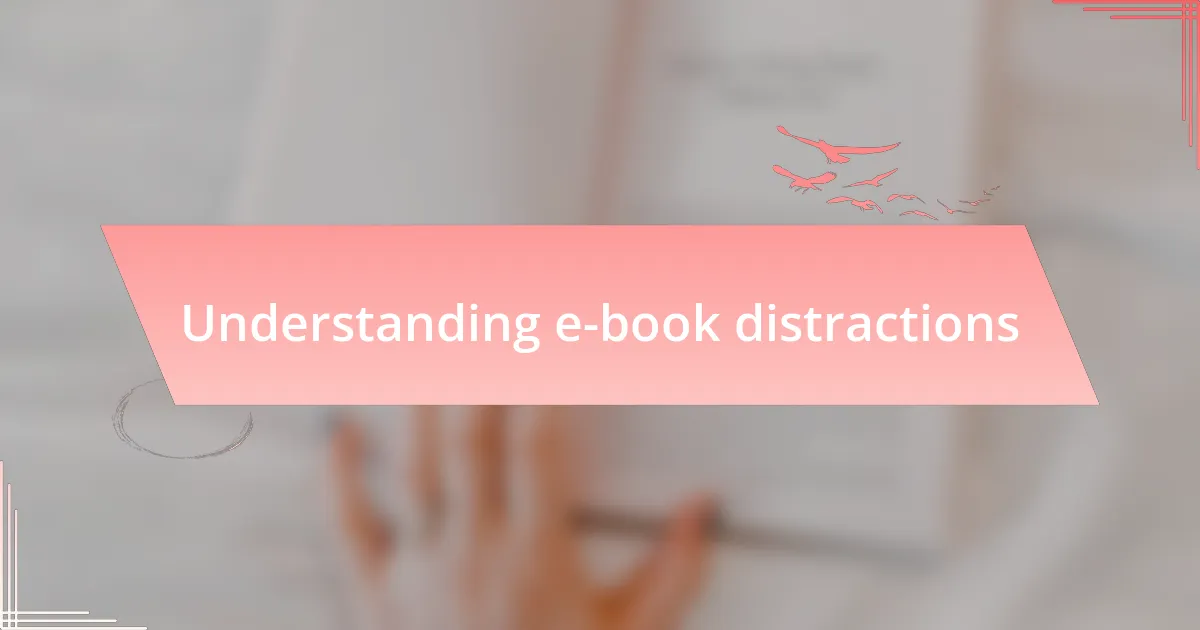
Understanding e-book distractions
E-book distractions can creep up on us when we least expect it. I remember one evening, I settled down with a captivating novel only to find myself habitually scrolling through social media between chapters. It’s fascinating how a simple notification can pull our attention away from the immersive worlds created by authors. Have you ever experienced that?
Many e-readers now come equipped with features that aim to keep us focused, but I sometimes wonder if these tools truly help or just distract in different ways. For instance, while I appreciate the ability to look up definitions instantly, I often find myself lost in a rabbit hole of linked content, veering away from the original text. It’s a paradox; the technology designed to aid us can simultaneously become a source of disturbance.
Understanding these distractions is key to improving our reading experience. As I engage with my favorite e-books, I think about how important it is to create a reading environment that minimizes interruptions. By identifying my personal triggers—like those enticing pop-ups or even the urge to multitask—I can better navigate my way back to the joy of reading without distractions getting in the way. What strategies have you found effective in maintaining your focus?
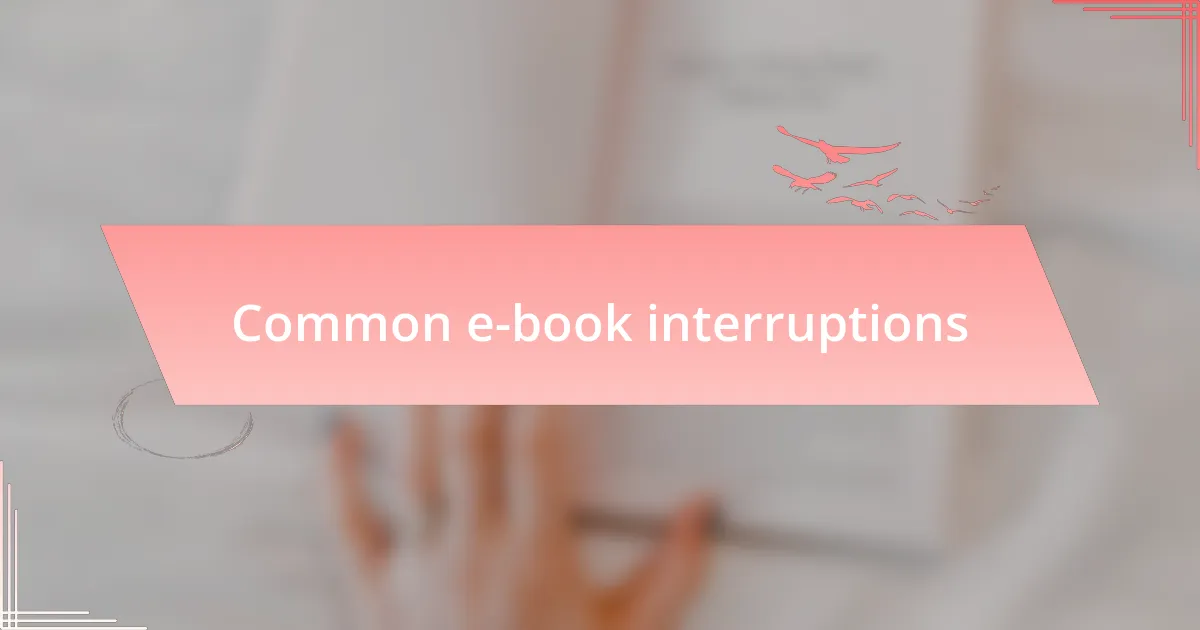
Common e-book interruptions
E-book interruptions often come from the unexpected pings of notifications. I recall a time when I was in the middle of a gripping plot twist, and suddenly, my phone buzzed with a message. It was so tempting to check it, and in that moment, the pull of the outside world felt stronger than the imagination of the story I was immersed in. Have you noticed how quickly a single notification can derail your focus?
Another common disruption arises from environmental factors. I’ve found that reading at the coffee shop, while enjoyable, can lead to constant distractions. The chatter of conversations and the clanging of mugs created a symphony of sounds that would break my concentration, making it hard to dive back into the narrative. How often do your surroundings pull you away from the story?
Sometimes, the biggest distraction can be our own thoughts. I’ve had numerous reading sessions where my mind would wander off into a mental checklist of tasks instead of fully engaging with the book’s characters. It’s baffling how the internal noise can outweigh the rich storytelling on the page. Have you felt that tug-of-war between your thoughts and the words in front of you? Recognizing these common interruptions can really help in reclaiming your reading time.
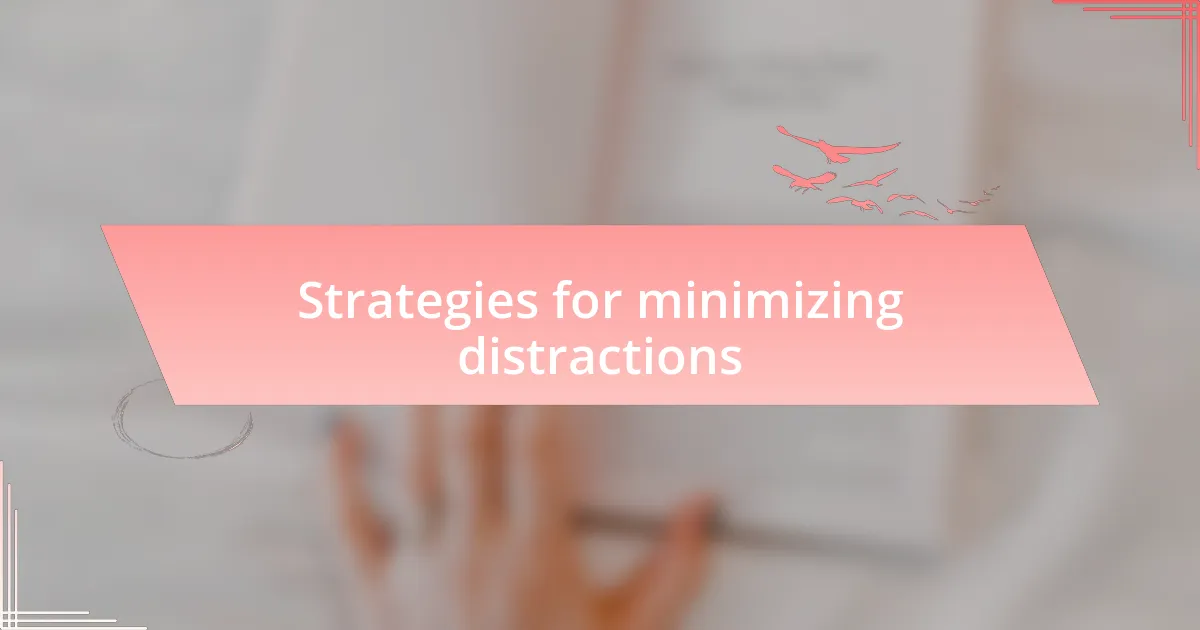
Strategies for minimizing distractions
One effective strategy I employ is to silence notifications before diving into a book. I remember a time when I left my phone on, and I barely got past the first chapter before I was pulled away. Now, I make it a point to put my phone on ‘Do Not Disturb’ mode. It’s surprising how much more I can absorb when those disruptive pings are out of the equation. Have you ever tried this simple step?
Creating a dedicated reading space has also been a game changer for me. I used to read anywhere—on my couch, at the kitchen table—but I found my focus slipping. Now, I reserve a cozy corner just for reading, free from clutter and distractions. When I sit down in that space, it’s like signaling my brain that it’s time to escape into another world. Do you have a spot that helps you find your reading flow?
Lastly, I find that scheduling my reading time helps curb distractions. When I commit to a specific hour for reading, it becomes a priority. I once wrote it in my planner as I would with a meeting, and the results were immediate. By treating reading seriously, I allow myself to indulge in the story without the nagging thoughts of daily chores intruding. Have you considered setting aside time in your day just for this indulgence?
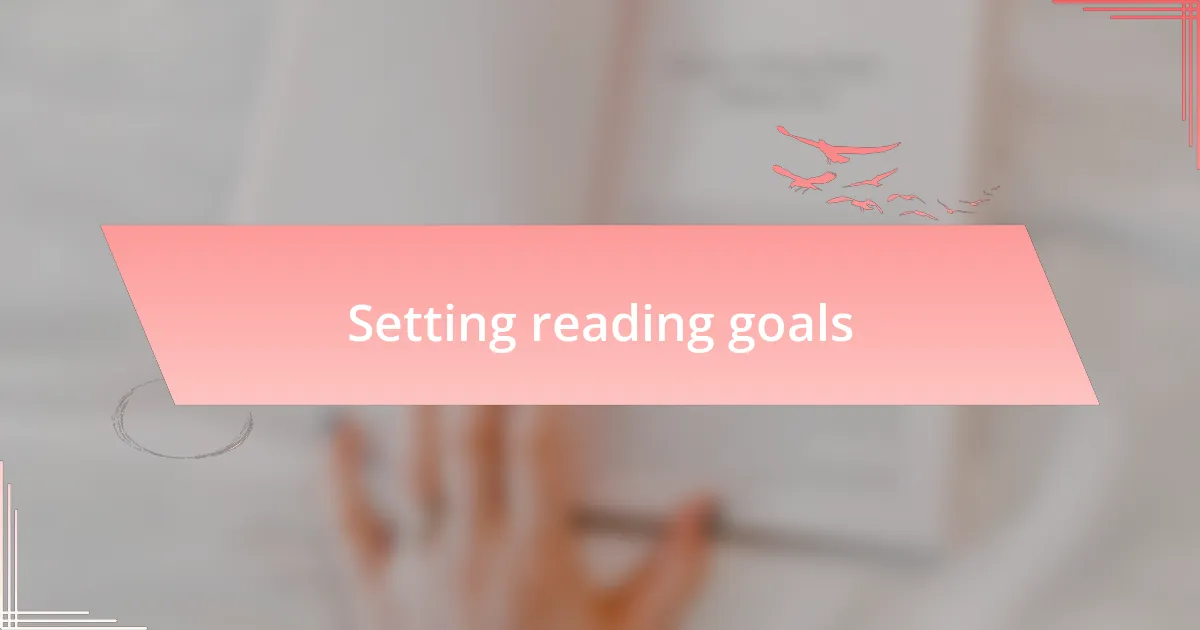
Setting reading goals
Setting reading goals has transformed my approach to e-reading. I once approached my reading without any specific target, which often led to half-finished books collecting digital dust. One day, I decided to set a clear goal of finishing at least two books each month. This simple shift gave my reading purpose and made each session feel like a step towards something meaningful. Have you ever thought about how having a goal could enhance your reading experience?
Additionally, I like to break down my goals into manageable chunks. Instead of feeling overwhelmed by a long novel, I aim to read a certain number of pages each day. This tactic not only makes the reading feel less daunting but also allows me to savor each moment. I remember a particularly lengthy fantasy series where I committed to just 20 pages a day. It was rewarding to see my progress, and that sense of accomplishment kept me engaged. What strategy do you think would work best for you?
Moreover, I find that sharing my reading goals with friends significantly boosts my commitment. We often have informal check-ins about our progress, which instills a sense of accountability. I recall a time when I joined a reading group focused on a specific genre. Knowing that I would discuss the book with others motivated me to stay on track. Have you considered finding a reading partner or group to help elevate your book journey?
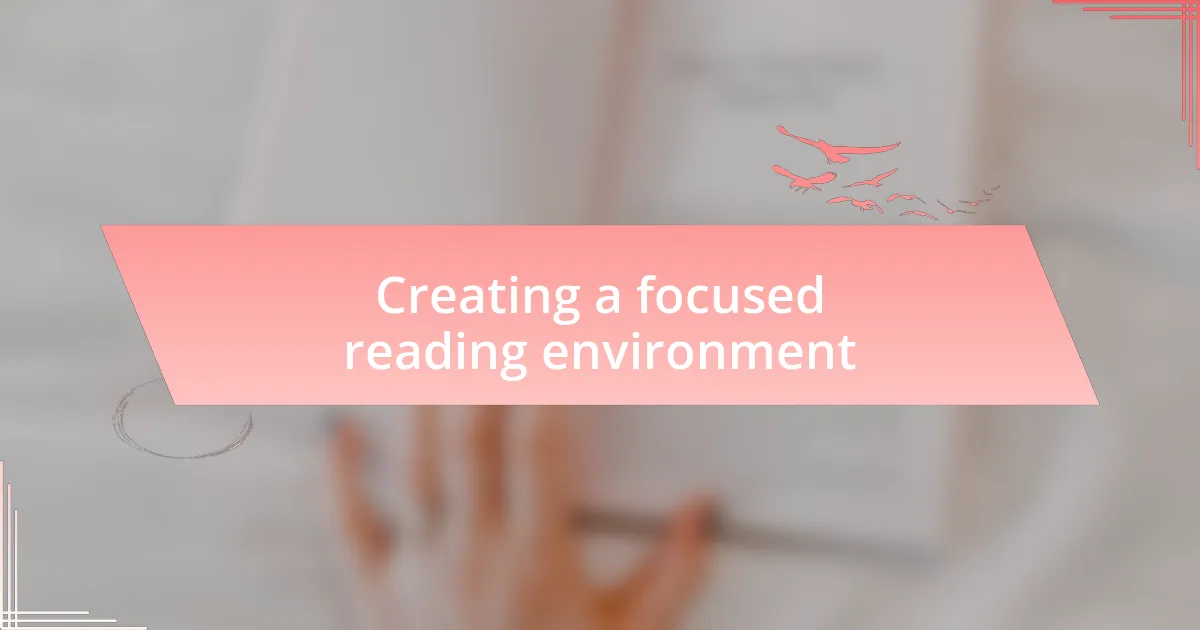
Creating a focused reading environment
Creating a focused reading environment is essential for getting lost in an e-book. I’ve discovered that establishing a dedicated reading space can significantly minimize distractions. For me, this meant setting up a cozy nook in my living room, free from clutter and noise. How often do you find yourself in a space that pulls your attention in every direction?
Another strategy I employ is to disconnect from the internet while I read. I used to leave my Wi-Fi on, thinking I could resist the urge to check notifications, but it never worked out. One evening, I turned off all devices except my e-reader and was amazed at how quickly I became engrossed in the story. Have you ever tried isolating yourself from digital temptations to achieve a deeper focus?
Lastly, I like to incorporate gentle background music or ambient sounds when I read. I’ve found that a soft playlist can drown out surrounding distractions, creating a bubble around me. One rainy afternoon, I put on a track full of nature sounds and felt more connected to the narrative than ever before. What atmosphere do you think would help you immerse yourself more fully in your e-books?
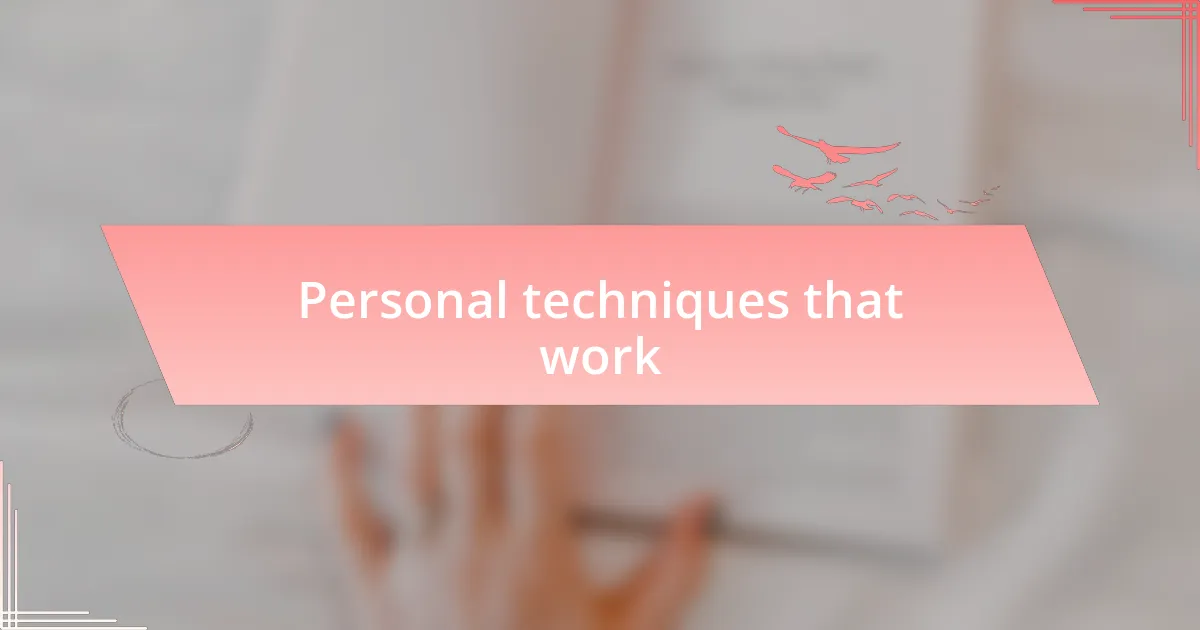
Personal techniques that work
One technique I’ve found especially effective is setting specific reading goals before I start. For instance, I challenge myself to read a certain number of pages or chapters in one sitting. This small commitment transforms my reading time into an engaging mission rather than just a casual activity. Have you ever felt that achieving little milestones enhances your focus and keeps you motivated?
Additionally, I often utilize the “Pomodoro Technique” while reading. This involves 25 minutes of concentrated reading followed by a 5-minute break. During those breaks, I stretch or grab a glass of water. It’s surprising how much this rhythmic approach helps me maintain clarity and prevent fatigue. Have you considered how short breaks could enhance your retention of the material you’re absorbing?
Lastly, I make it a point to read at times when my mind is naturally more alert, such as in the early morning or late evening. I’ve noticed that my mood plays a significant role; when I’m feeling more relaxed and less inundated by the day’s demands, I can dive deeper into my e-books. What time of day do you feel most inclined to lose yourself in a good story?
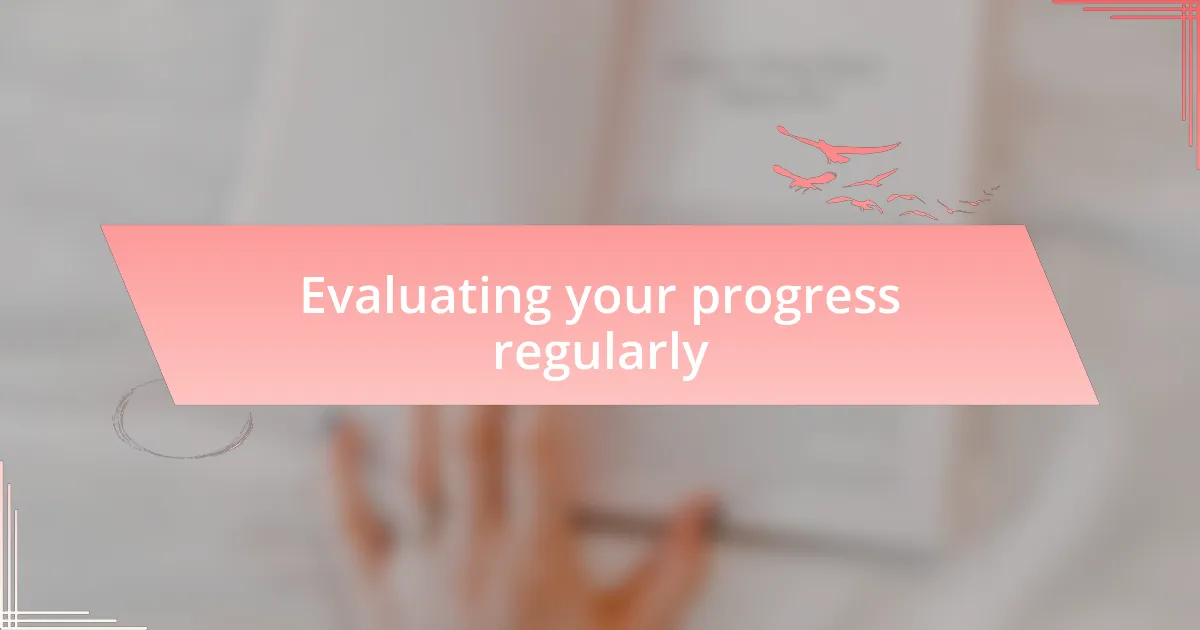
Evaluating your progress regularly
Evaluating my progress regularly has been a game changer for my reading habits. I like to take a moment at the end of each week to reflect on what I’ve read. This simple act allows me to not only track my accomplishments but also to identify areas where I might have gotten sidetracked. Have you ever considered how seeing your achievements laid out can rekindle your motivation?
There are times when I’ve realized that I haven’t made as much progress as I’d hoped, especially during busy weeks. In those moments, I find it helpful to adjust my reading goals. Instead of feeling overwhelmed, I remind myself that it’s perfectly okay to recalibrate. This flexibility has taught me that progress isn’t always a straight line; sometimes, it’s about finding the right rhythm that works for me. How do you handle weeks that seem to fly by without any reading?
To make this process easier, I’ve started keeping a reading journal. Jotting down my thoughts and feelings after each session helps me clarify what resonated with me and what didn’t. It’s remarkable how this practice deepens my understanding of the material and keeps me engaged with my e-books. Have you tried documenting your reading experiences? You might discover insights you hadn’t considered before.